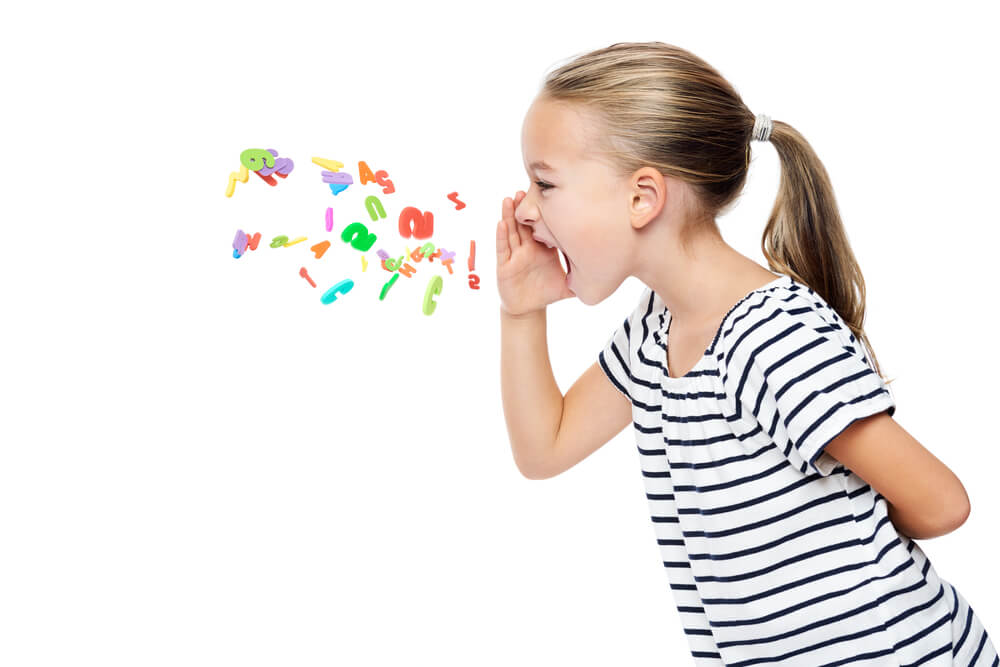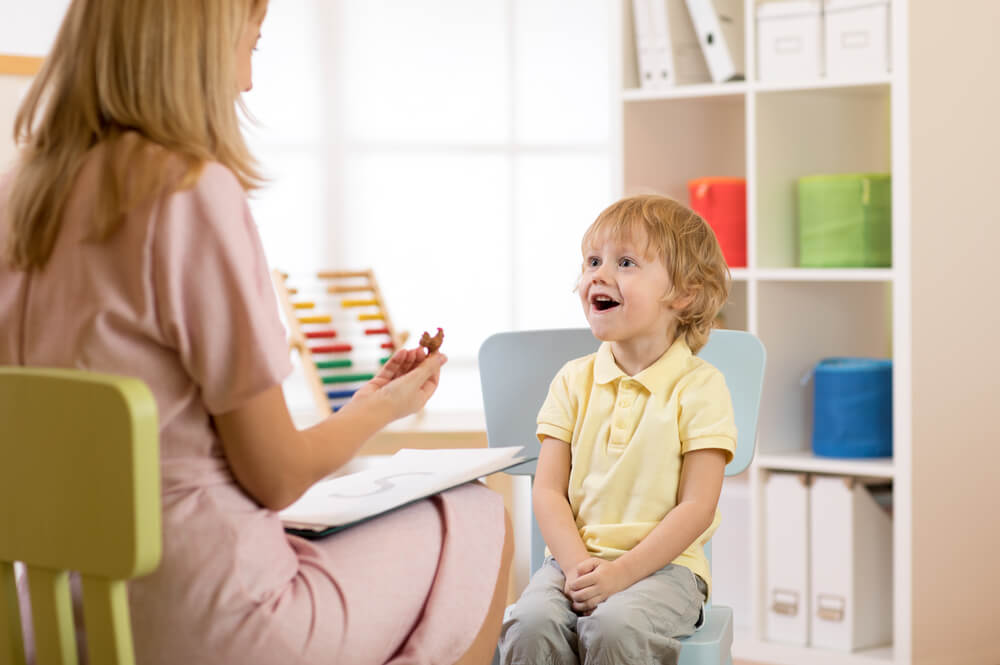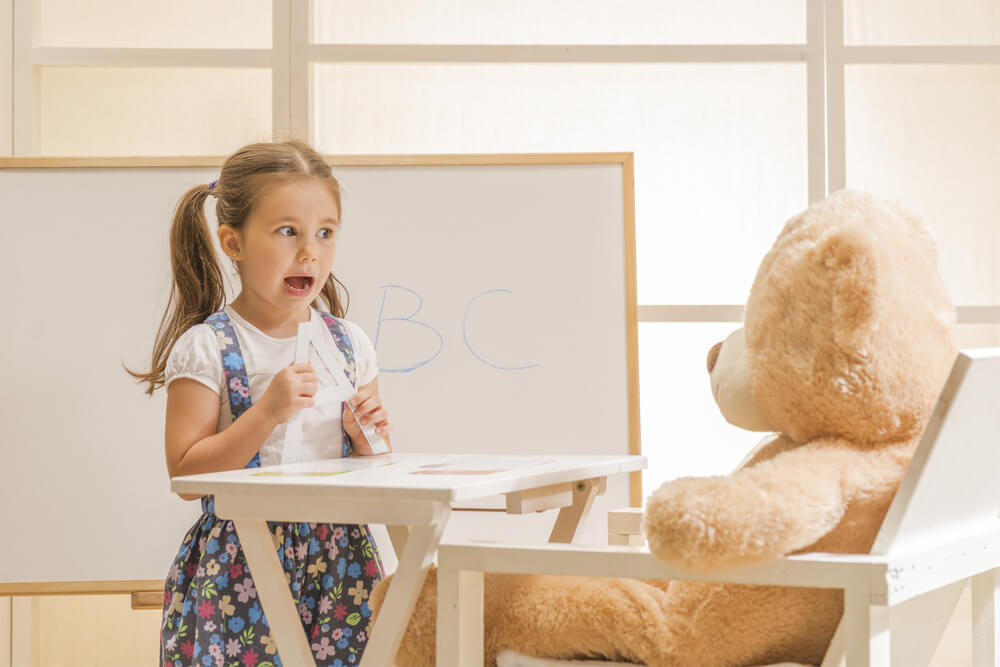Many concerned parents ask, ‘Does my child need speech therapy?’ It can be very frustrating for parents and teachers alike when they notice communication problems early on. But finding out that your child has problems expressing themselves is important.
What signs do pediatricians look for to diagnose expressive language disorder in toddlers and preschoolers? Before we answer these important questions, what exactly do we mean by expressive language?
Expressive Language definition
According to the National Institute of Health, “expressive language, or language production, is the ability to encode one’s ideas into language forms and symbols.” We must know that there is a difference between your child’s language comprehension. For example, your child may hear and understand your words, but can they express an answer to your question? Do they nod their head but maybe have trouble verbalizing? Expressive language examples include speaking, writing, gesturing and signing. What shows that my child has an expressive vocabulary? What signs would indicate that my child or toddler has a speech disorder and may need speech therapy?
Expressive Language Skills – Expressive Vocabulary
A child’s first word, like ‘Dada’, is one of the first milestones that parents get excited about. You may not realize it, but your child’s first word is an important expressive language marker. Some 5 to 8% of children may have a delay in speech and may show signs of developmental delays, according to the Journal of Neuro-developmental Disorders. Please see more about this topic at https://jneurodevdisorders.biomedcentral.com for more information on expressive language disorders.

Pre-school Speech and Language Goals
As your child grows and attends pre-school, ask yourself a few questions about the words they use to communicate. Do they use vague or non-descriptive words, like “stuff” or “things” a lot instead of the actual word or noun for what they are describing? Does your child often jumble phrases and have trouble putting sentences together? Can they sing a simple song or recite a small poem or nursery rhyme? If they are very young, they may still be able to catch up to their peers and the delays will be resolved with time and interaction with children and childcare providers. If they are not catching up to their peers within the first few years, however, they may be showing signs of expressive language disorder.
Does My Child Show Other Signs of Expressive Language Disorder- Expressive Speech
Ask yourself, compared to other children their age, does my child speak in much shorter sentences? Do they tend to look away when asked a question? Do they seem to have selective hearing? Do they use the same descriptive phrases and vocabulary that other children their age group seem to grasp without issues? Can they retell a short story and put the order of events in the proper sequence? If you read to them and ask questions about the story, are they able to recall simple details?
Again, if your child is still a toddler, some of these questions may need to be asked later on as they continue to develop. But right now, how do I know if my toddler needs speech therapy? When do I need to make an appointment with my pediatrician about these concerns? Is it too soon to tell if my young child has expressive language disorders?
Expressive Language Disorder in Toddlers
Most infants and toddlers understand verbal and non-verbal communication long before they have the ability to verbalize themselves. If you are noticing that your child does not respond to normal sounds and stimuli, it may be best to make an appointment with your pediatrician to have your child’s hearing checked. Your pediatrician may also refer you to a speech language pathologist. You know and understand your child better than anyone, so ask questions and be sure you find out early on why your child is having trouble hearing or understanding you.
Does My Child Need Speech Therapy?
After finding out that your child’s hearing is normal, you may be wondering why your child is still showing signs of expressive language delays.
What is your child like in social situations? Do they try to communicate with others, or do they shut down? Some children have selective responses, or they may not feel a need to communicate. What if my child just seems shy? How do I know if they need speech therapy? When to talk to your doctor is an important step in overcoming your child’s expressive speech problems. And, if you notice early on that your child seems to have a hearing problem, it is important to get them seen by a specialist quickly to help resolve these issues.
The best course of action is to talk with your healthcare provider first, so that they can rule out any other neurological or developmental delays that could be caused by medical conditions. Some expressive language disorders tend to run in families. But other problems like low birth weight, premature birth, autism, down syndrome and other disorders may also interfere with your child’s learning and behavior.
One thing is clear; you need your pediatrician’s input. They know what to look for, and most importantly can point you in the right direction to find a specialist that can best help you and your child’s unique situation.

My Child Needs Speech Therapy. What Are the Goals of Speech Therapy?
A Speech Language Pathologist (SLP) will most likely evaluate your child in a play setting to see how they interact with others. They will also evaluate your child one on one to run a series of tests to see what your child’s language strengths and weaknesses are. The SLP will look for how your child speaks, listens, follows directions and understands verbal cues.
What is the goal with my child’s expressive language disorder? Will they be able to catch up with their peers and can my child’s expressive language disorder be overcome?
With help from a speech language pathologist, your child can overcome expressive language disorder. The SLP will teach your child how to relax and will help your child overcome any fears or anxiety they may have when it comes to self-expression. SLP’s use tools like toys, books, online interactive games and other learning tools to help bring out the best in your child. As with any other developmental delay, knowing what to look for and early diagnosis are key.
The Speech Language Pathologist may also suggest using arts and crafts to help your child with expression. They will explain more about the methods of diagnosis and treatment that will be best for your child’s specific expressive language disorder.
So now that you know more about expectations when it comes to expressive language, please feel free to comment below or leave a question for one of our staff. We look forward to being there to help you and your child as they grow and develop. Also, feel free to share your story with others. You may help a parent who has the same concerns at https://www.toplinemd.com/ana-hpmd/.




